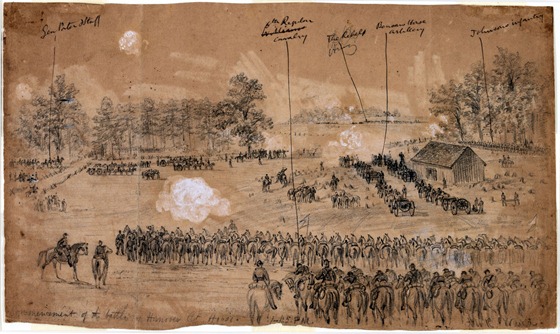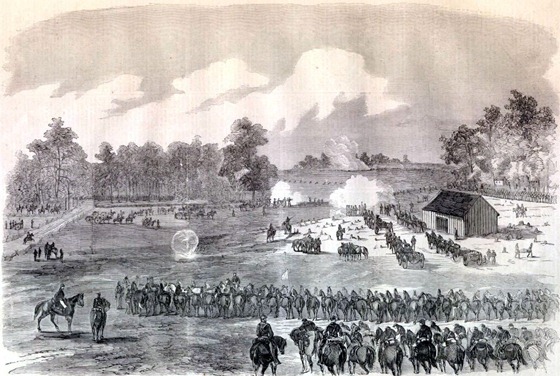May 27.—The schooner Andromeda, from Sabine Pass, was captured off Mariel, Cuba, this day.—A portion of Gen. Fitz-John Porter’s corps engaged and defeated the rebels at Hanover Court-House, on the Pamunkey River. Five hundred rebels were made prisoners and a hundred dead were left on the field.—(Doc. 16.)
—Six men of the First Missouri cavalry, under command of Lieut. Pruette, in advance of a foraging party on the northern road from Searcy, Arkansas, were fired upon by about forty rebels, concealed in the adjoining bush, mortally wounding two or three of their number. The foraging party coming up, succeeded in killing four of the rebels and taking some prisoners.—St. Louis Democrat.
— The steamer Gordon, (Nassau,) whilst attempting to run the blockade of Wilmington, N. C, was captured by the gunboats State of Georgia and Victoria. — The bombardment of Fort Pillow on the Mississippi was resumed after nearly a week of quiet on the part of the Union troops.—Baltimore American, June 3.
—A fight took place near Corinth, Miss., between a force of Union troops under the command of Col. Purcell of the Tenth Iowa regiment and a brigade of rebel infantry, resulting in the defeat of the rebels with considerable loss.
—The Speaker of the House of Representatives at Washington laid before the House a message from the President, referring to the history of the commencement of hostilities, and his exercise of the broad powers of the Constitution to preserve the capital of the country during the absence of Congress. Incidentally with this, he referred to the arrangements with Gov. Morgan, Alexander Cummings and others, with a view to speedy and efficient protective measures. By these means he believed the Government was prevented from overthrow. He had no knowledge that even a dollar was lost or wasted. The President quoted the House resolution censuring Mr. Cameron, and said that not only himself, but all the heads of departments, were responsible with Mr. Cameron for whatever error, wrong or fault had been committed.—(Doc. 47.)
—In New-York City the military excitement, occasioned by the calling out of the State Militia, continued, and the greatest bustle prevailed at the different armories —recruits applying to be admitted as members of the regiments, officers despatching the necessary business connected with their departure, and orders hourly arriving containing the instructions from headquarters.
—The schooner Lucy C. Holmes was captured by the United States gunboat Santiago de Cuba, on the coast of Georgia, having run the blockade of Charleston, S. C, the night previous.
—General Mcclellan sent the following despatch to the War Department:
I find some of the newspapers publish letters from their correspondents with this army, giving important information concerning our movements, position of troops, etc., in positive violation of your orders. As it is impossible for me to ascertain with certainty who these anonymous writers are, I beg to suggest that another order be published, holding the editors responsible for its infraction.
—The Sixty-first regiment of Ohio volunteers, left Columbus for Washington. — The Norfolk (Va.) Day Book, which was allowed to continue its issue by Gen. Viele, after the occupation of Norfolk, on condition that it should be respectful in its tone, was to-day suppressed in consequence of a communication in yesterday’s paper signed “Enquirer,” which in severe language assails those Union citizens who have taken the oath of allegiance to the United States. A meeting was held last night, in which the course of the paper was discussed, and a committee having waited upon Gen. Viele and stated their request that the paper should be stopped, he acquiesced, and the order was issued this morning.
—Governor Curtis of Pennsylvania issued a general order countermanding the order for enlisting three months’ volunteers, the emergency which seemed to require them having passed. He congratulated the people on the fact, and commended the alacrity shown in every part of the State in volunteering for the defence of the National capital.
—The gunboats Stepping-Stones and Cœur de Lion made a reconnoissance a short distance up the Appomattox River. When about a mile up the river, they were attacked by a party of rebels who were lurking among the houses. The gunboats returned the fire; and, after cannonading for about half an hour, completely riddling the houses, they returned to City Point, on the James River.—Baltimore American.


 Camp on Corinth Road, Miss., May 27, 1862.
Camp on Corinth Road, Miss., May 27, 1862.

 May 27.—We are all packed up, and intend leaving this morning. Mrs. Glassburn and nearly all the ladies are going to Brookhaven. I intend going to Okolona, and there remain until I learn in which direction the army will move.
May 27.—We are all packed up, and intend leaving this morning. Mrs. Glassburn and nearly all the ladies are going to Brookhaven. I intend going to Okolona, and there remain until I learn in which direction the army will move.


